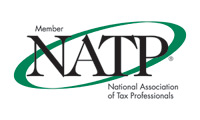 My first blog post appeared on August 6th, 2008. I credit Robert Flach of The Wondering Tax Pro with mentoring me into the blogging world.
My first blog post appeared on August 6th, 2008. I credit Robert Flach of The Wondering Tax Pro with mentoring me into the blogging world.Robert has been preparing individual and business tax returns for people from all walks of life, from professional football players and actors to doctors and architects to secretaries and clerks since February of 1972.
I consider it a great honor to have Robert as a friend and a colleague. Below is an interview I conducted with Robert last month. At the Conclusion of the interview Robert had been notified of his being Named as the NATP Preparer of the month for January.
I hope you enjoy it as much as I did.
Bruce:
Writing about taxes and finance isn’t the easiest thing for anyone to decide to do. You write/have one of the most popular blogs on the net entertaining this subject. What took you there? To clarify, why do you write about tax issues? What drives you to blog on the inner workings of our tax system?
Robert:
“They” say to “write what you know”. I write about taxes because it is what I know.
I have been writing for as long as I can remember – beginning as a child. And I have been writing about taxes for almost as long as I have been preparing taxes. I tried several times, unsuccessfully, to start a monthly newsletter called “The Ten Forty Letter” and to write a newspaper column on taxes.
I learned about “blogging” at a seminar at the 2001 NATP annual conference in New Orleans. Prior to that I had never seen or heard of a “blog”. The first post of THE WANDERING TAX PRO appeared on July 22, 2001.
If I may quote from an article on blogging that I wrote for the NATP quarterly TAXPRO Journal –
“I had decided to write a blog to provide year-round advice and information to my existing clients and to promote my tax preparation and accounting services. . . Currently I don’t solicit or accept any new 1040 clients, nor do I accept any corporate or partnership clients. But I continue to blog to provide a source of updated federal and state tax information for my 1040 clients, to attempt to market my various special reports and newsletters, to provide easily accessible samples of my writing for potential publishers, and, quite frankly, because I just enjoy it.”
Through the blog I have received national exposure and developed a nationwide reputation. It was because of my blog that I got the gig to write on taxes (daily during the tax season) at MainStreet.com.
I also enjoy the feeling of camaraderie between most fellow tax-bloggers.
Bruce:
Your Blog is fantastic in my eyes. The article you wrote on blogging for the NATP TAXPRO Journal is what I call my first exposure/introduction to the blogging scene. So thank you for that.
I am curious; you mentioned national exposure and a nationwide reputation, you’re not looking to strengthen your client base, so is it fame that you seek, or is it more the knowing that you are helping those with tax interest on a national level?
Robert:
There is some aspect of fame involved I suppose – everyone wants recognition within their chosen field. But the national exposure/reputation is more helpful in getting writing gigs and soliciting publishers.
Also, I love it when CPAs from across the country email me, a college drop-out, for tax advice! Not that I give it. . .
Bruce:
Drop out? Wow, what caused you to leave college? Where did you go?, How long where you there?, what your major?
Robert:
My mistake was that I was a Business Management major and not an Accounting major. I found that I got a better education at 59 Sip Avenue (the storefront tax office where I started) during the tax season, and had gotten a better education at an inner city high school, then at an inner city Jesuit college. This was the early 1970s. I went for 3 years. I eventually got my basic and graduate degree based on applying the 3 years of college credit and life/work experience.
Bruce:
Why do you like this field?
Robert:
I find taxes fascinating and fun.
I learned how to prepare taxes via on-the-job training while working in a storefront (although not a franchise operation) tax office in an urban business and transportation hub, dealing with the “great unwashed masses”. There was never a dull moment.
My mentor worked 12 hours a day, 7 days a week for 2½ months out of the year – and very casually the rest of the year. I liked that schedule and wanted to do the same.
To paraphrase a TV character from the 80s – “I love it when a tax return comes together”.
I obviously like writing.
Bruce:
OJT. Seems rather a sink or swim situation. I mean, just in the field seems like you had a lot to absorb the first few years just to get the basics. There was no formal upper ended training? Do you hold any degrees?
Robert:
Your “sink or swim” comment is appropriate to my OJT. On my first day of work my mentor gave me a client’s prior year 1040 and a briefcase full of the current year’s “stuff” and told me to, “Jump in and swim!”.
I feel I learned how to prepare 1040s the best way possible – by actually preparing 1040s. If I had a question while in the process of a return I would either look it up in his CCH books or ask my mentor, who would take the time to explain it to me, often referring me to other client return copies as examples. I learned the basics rather quickly, and worked on more involved returns as I returned each year.
I did not take a tax course in college. I did, in the mid-70s, take and pass the National Tax Training School correspondence course, so as to have some kind of “diploma”. My degrees are based on life and work experience, so my OJT tax training provided my degree and it was not my degree studies that provided my tax training.
And obviously I have attended many annual CPE offerings over the past 39 years.
Bruce:
I was raised on the philosophy of the school of hard knocks so I can relate to that aspect, as it much describes a vast amount of my own training. In the 70’s you took and passed the National Tax Training School correspondence course; what was your score? And how do you think you might fare if you took that same test now?
Robert:
I have no idea of my score – it was over 30 years ago. All that I saved was the actual diploma. I do not know if they are still in existence – I expect I would ace the test today.
Bruce:
What are your weaknesses/strengths as a writer?
Robert:
They say that brevity is the soul of wit. I need to learn to be more “economic” in my writing. It was a good learning experience having to confine my items for MainStreet.com to 200, 250, or a specific number of words. It was good practice trying to fit what I wanted to say into a limited space.
Bruce:
In your own words can you describe today’s financial market?
Robert:
I do not pretend to have much knowledge or experience in investments. I specifically tell my clients that I do not offer financial or investment advice – the most I can do is explain the tax consequences of financial or investment choices they may be faced with.
My mentor would always paraphrase the popular quote – “Bulls make money, bears make money, but hogs always lose” (or is it “pigs get slaughtered”?). It seems that we are currently faced with the consequence of the actions of a lot of hogs – and even those of us who were not greedy are affected.
Bruce:
It’s “Bulls make money, bears make money, pigs get slaughtered.”, or so I was always told and read. So, even though you offer the explanation of the tax consequences a taxpayer might be faced with, you do not really follow what happens there? Why not?
Robert:
A wise old broad (my boss at the Summit YWCA in the mid 70′s) once told me that “only Sherwin Williams can cover the earth”. It takes enough time to follow the changes in the Tax Code that I do not have the time, or inclination, to follow the market as well.
While a lot of investment/financial decisions involve common sense, a commodity often lacking today, one main reason I do not provide investment/financial advice to clients, solicited or otherwise, is so they cannot complain to me when the market crashes or if I tell them to buy a stock that goes down.
Bruce:
In your own opinion, what is your biggest flaw?
Robert:
Professionally I suppose I think of my clients too much as friends and therefore charge less than I should. While ambitious I am also a bit lazy, and tend to procrastinate too much. There is always “mañana”.
Bruce:
As a writer what is your current goal?
Robert:
To get more paying gigs as a freelance writer on tax planning and preparation topics. To have a book or two on taxes published. To write a mystery novel with a tax pro as detective (Death and Taxes would be a great title, if not already taken).
Bruce:
Okay now – can you share your goal in life?
Robert:
To live as long as my father – healthy and financially independent. In my younger days I would have said to produce a musical on Broadway. As my mentor would say – to die with no debts and just enough in my pocket to pay for the funeral and burial (though I will probably request to be cremated).
Bruce:
What was a major obstacle you have faced as a tax and personal finance writer?
Robert:
I guess finding gigs as a paid writer – at a reasonable and professional rate of compensation.
Bruce:
What was a major life obstacle you have faced?
Robert:
I do not believe I have had to face any obstacles in life – I had no special “handicaps”, other than possible occasional poor judgment (as we all have), to overcome.
Regrets
I’ve had a few. But then again, too few to mention. I do not regret not legally marrying. Looking back I only have two real regrets in life. The first is that I did not take my piano lessons seriously as a child. I would love to have been a white Bobby Short – playing APS in bars and clubs (although I probably would also need a singing voice). And the other involves a missed opportunity with a one-legged client (don’t ask).
Bruce:
Okay, I’ll leave the missed opportunity for another time. Can you tell us of a professional disappointment that still gives you pause?
Robert:
To be honest there is none that I can think of as I write this response.
Bruce:
That is fantastic. There isn’t a return or situation professionally that when it comes around again, you don’t hesitate or pause with the proverbial ummmm… ?
Robert:
Things that make you go “ummm”? If a return or professional situation was disappointing or problematic I simply do not repeat it. Any specific professional regrets usually involve procrastination, which I need to overcome.
Bruce:
Where do you see yourself in 5 years?
Robert:
Hopefully still preparing 1040s (if I last 11 more seasons – including the upcoming one – I can say I have been preparing 1040s for 50 tax seasons!) but with a thinned “herd”.
Also hopefully earning more money as a paid freelance writer. And, probably living in Pike or Wayne County, Pennsylvania.
Bruce:
50 Tax seasons, that seems to be a life time. Pike or Wayne County, PA. Why one of those places? Something special there?
Robert:
These two counties are next to each other and, for me, interchangeable. I specifically refer to Honesdale, Beach Lake (Wayne) and Hawley/Lake Wallenpaupack (Pike). My mother grew up “over the bridge” in Lake Huntington NY (Sullivan County) and my family and I have been going to this area in the summer just about every year since I was a wee lad. I am familiar with the area, and it certainly has a much cheaper cost of living than New Jersey. I like the 4 seasons, so I would certainly not go south.
My only regret in moving would be that I would no longer be an hour from Times Square (re Broadway and off-Broadway theatre) via bus – but it is only a little over 100 miles away.
I have done PA returns occasionally over the years, and it is similar to the NJ-1040 in that it is also a “gross” income tax. I would have no problem picking up PA clients, if needed. And about 2/3 of my clients already mail their returns to me as it is – with several more just dropping off. I rarely do “sit down” appointments where I prepare the return “as you wait” anymore.
Bruce:
Moving that far could put a damper on the Wandering part, is that what you are saying? Do you see yourself moving after you retire?
Robert:
My mind will still wander, I will continue to wander around on the internet, and I will continue to travel. My first plan was to move to the Jersey shore area (Monmouth County) right away, and then to PA in 3 or 4 years – but I may bypass the shore and go directly to PA within a year or two. I will remain in PA after I have reached the 50 tax season mark, unless I find I do not like it (in which case I would move to Jersey shore area).
Bruce:
I ask this because I have heard you can tell more by this. What was the last book you read?
Robert:
“The 5th Horseman” by James Patterson and Maxine Paetro. I only read murder mysteries – those with clergy as detectives, with cats involved (speaking and non-speaking), written by Ed McBain (Evan Hunter), Margaret Truman and JJ Jance, later entries in the Donald Bain “Murder She Wrote” series, and I liked Al Roker’s first entry.
Bruce:
Is there any one you would like me to interview next?
Robert:
Anyone in our “circle” would do – Joe, Russ, Kelly, Trish, Kay, Monica, Stacie, etc. You choose.
Bruce:
Very cool. Thank you very much Robert.
You can find more from Robert:
http://wanderingtaxpro.blogspot.com
http://njtaxpractice.blogspot.com
http://www.mainstreet.com/category/authors/robert-d-flach-0
© 2011, The Missouri "taxguy". All rights reserved.
















